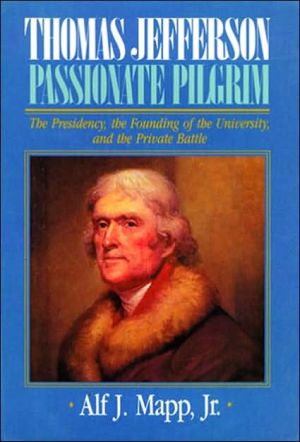

 |

|

The average rating for Thomas Jefferson based on 2 reviews is 3 stars.
Review # 1 was written on 2009-12-02 00:00:00 David Thornton David ThorntonIt must be difficult to write a biography of Jefferson. Where do you start? Where do you stop? Unlike so many presidents, politics was just one small part of his life. Something he engaged in because it was a part of the responsibility of a man of his class - but not something by which he defined himself. When you look at the question this way, you understand why it might take Dumas Malone 6 volumes; such tonnage may be the only way to adequately describe at adequate depth all of the things Jefferson was engaged in. The fact that I make this observation after reading the second and concluding volume of Professor Mapp's biography is no coincidence. As with his previous volume - The Strange Case of Mistaken Identity (which i believe was thankfully retitled "America's Paradoxical Patriot") - no real sense of Jefferson emerges from this biography. Why? Is it because Jefferson's life was so full that you must choose to either 1) skim the surface (as Mapp does), 2) only elucidate some key illuminating events, 3) spend the entire volume analyzing and assume the reader knows the facts or 4) write a Dumas Malone version? I don't know. But I do know what I'm looking for, and that, in short: 1) the story of a subject's life 2) a sense of that subject as a person, 3) as objective an analysis of that subject's life as the biographer is capable. This last request is the most difficult; not only because objectivity is often mistaken for disinterest, but because I realize that anyone who dedicates a portion of their life to writing a biography must, by definition, have a profound fascination with that subject. If they weren't fascinated, they wouldn't have written the book. And I expect that, and as a reader of biographies, I try to read through that filter. What is frustrating about Professor Mapp, however, is that his filter is so strong that his biography often reads like a defense or justification of Jefferson instead of the history of him. Connections are not made. Facts are shaded. Misdirection abounds. For example: • Professor Mapp celebrates Jefferson's and Madison's electoral triumphs without pointing out to the reader that the 3/5s rule was in effect (every slave counted for 3/5s of a "white man's vote" - thus giving the south a lopsided population count and corresponding electoral count. Conveniently, Professor Mapp excludes popular vote counts, which would have shown much closer elections). • Further, Professor Mapp claims at various points during Jefferson's presidency that he enjoyed great popularity - and yet there is no citation substantiating the claim. We are to take it on faith that his second term, which many call a failure, was not viewed as such by the public. • The Professor consistently refers to Jefferson's slaves as his "servants", effectively blurring the line between those whom the third president employed and those he owned. Indeed, one could read both volumes of the biography and hardly understand that Jefferson owned any slaves at all. And I don't think you can understand Jefferson or his culture without understanding the key role slavery played in allowing it to happen. • Professor trumpets Jefferson's efforts to outlaw the importation of slaves as a sort of step towards emancipation. At first blush this looks encouraging, until one considers what any economics student will point out - that if you stop the import of a product, all existing products become more valuable - a fact probably not lost on the perennially bankrupt Mr. J. In short, ending the arrival of new slaves made his slaves more valuable. • But then Professor Mapp whiplashes back and says that while we can praise Jefferson for being so far ahead of his time in so many other things, we are naive to judge him by our time where slavery is concerned. Why? Because he was, after all, merely a man of his time. • This is probably the reason why he skips the incident late in Jefferson's life when he was visited by an abolitionist starting repatriation in Liberia, who asked for Jefferson's support. Jefferson, it should be noted, demurred. • And lastly - and I concede that this is something of a personal complaint - Professor Mapp doesn't connect Jefferson's claim that the Constitution should be torn up every 20 years and re-written with the fact that Jefferson was president on the 20th anniversary of the constitution and did nothing to enact his bold claim. Perhaps he was too busy squashing Burr's "rebellion" in Louisiana - another event that would have been ripe for Professor Mapp to discuss in terms of the younger Jefferson's thoughts about revolution. Alas, no... And through it all, Professor Mapp relies - as he did in the preceding volume - so heavily upon Jefferson's correspondence, that the book often reads like a transcribed day planner. But more regrettably, especially in the sections where the Professor relies nearly exclusively on the correspondence, this does not give us a much needed perspective on our third president. Not until the final chapter which reads like a lawyer's defense, and not an analysis. Do I reccommend this volume? No. Nor the other. And indeed, I cannot say I would read any other works by Professor Mapp. Very disappointing indeed. |
Review # 2 was written on 2014-01-07 00:00:00 Joshua Bucher Joshua Bucher5 stars. A scholarly, intellectually challenging read. |
CAN'T FIND WHAT YOU'RE LOOKING FOR? CLICK HERE!!!